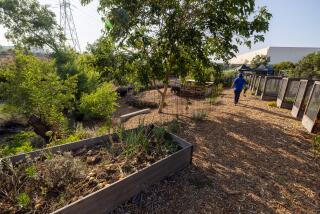PERSPECTIVE ON EDUCATION : For Children at Risk, a Sanctuary : Inner-city residential schools would offer a safe environment for learning and growing, with family nearby.
- Share via
The time has come for some truly dramatic solutions to the problems plaguing so many of our urban schools.
It is not that the past reforms advocated by educators and educational policy-makers lack merit; it is that far too many of these reforms seem myopic. Their emphasis is on improving individual schools, whether by introducing school-based management principles or outfitting classrooms with computers, to take two examples. But such efforts fail to take into account the crucial role that environment plays in the ability and willingness of students to learn.
There are--and have been--families able to inspire their children to achieve academically even when living under the most dire circumstances. Such families are becomingly increasingly rare.
Today, the home and neighborhood environments of a significant segment of the school populations of our urban centers are clearly antithetical to learning. Too many of our young people are growing up in homes in which disorder, neglect and, often, violence is the norm, or in which parent or parents are so hard-pressed to make ends meet that nurturing a child’s intellectual growth has little or no priority. Too many of our young people live in neighborhoods that rank high on every indicator of social ill and where the only dazzle comes from the gold jewelry and flashy new cars of the local drug lords.
Even if schools have fine programs, facilities and equipment, they often cannot reach youngsters growing up in such surroundings. Yet, without quality education, these youngsters appear destined to join what more and more commentators are calling a permanent underclass.
What is to be done?
If we are serious about educating these young people, we must intervene. We must either change their environment or create a sanctuary within it that will allow them to reach their fullest potentials. Past history would seem to indicate that this nation does not have the will or the interest to effectively change detrimental environments. Therefore, I believe, we must begin to explore the sanctuary idea.
What I am proposing, specifically, is the creation of neighborhood-based urban residential schools for youngsters who are at risk.
As I envision it, admission into these schools would be purely voluntary. I doubt that there would be any problem in recruiting students. There are many parents in our urban cores who desperately want to provide their children with positive experiences--educational and otherwise--and would welcome any opportunity that could make that possible. Put more bluntly: They also desperately want to keep their children off the streets.
These residential schools would place a strong emphasis on mastering basic skills and achieving scientific and technological literacy. They would inculcate in their students humanistic values and respect for the individual and the group. They would promote good health through a nutritious diet and exercise, including intramural and extramural sports. They would instill discipline by such means as setting aside designated periods for study. They would teach students at least the rudiments of a trade and would enable them to earn money practicing that trade. Above all, they would instill in their students the expectation that they would succeed.
These schools would not cut students off from their families or from their communities, but would provide them with breathing space to grow and develop within their own environment. In fact, parents and other family members would be required to participate in school functions, and students would be able to return to their homes on weekends and holidays. Moreover, in their home neighborhoods, these students would serve as positive role models for younger children.
A utopian vision? An economically unfeasible pipe dream? Establishing urban residential schools even on the small scale of a pilot project would, indeed, be an ambitious undertaking. I don’t think it would be as costly as some people might think. We could, for instance, make use of under-utilized school buildings that already dot the urban landscape. Still, there is no doubt that such a venture would be costly. A less-costly alternative would be to establish extended day schools augmented by summer residential schools. But extended day schools alone would be even less costly and a less “radical” alternative.
I am not suggesting that all or any of these models constitute the only solution to ensuring that all our youth survive and thrive. But what I am suggesting is that future educational reforms must come firmly to grips with the issue of environment.
We could, of course, blithely go about the business of trying to “improve” our schools, totally ignoring the special needs of those young people whose environment puts them at risk. But then we must be willing to accept the consequences of this approach: a tragic waste of potential talent and the assurance that many of these young people will become a burden, if not a bane, on society.
Such an approach, or more accurately, such blindness, also would have tragic reverberations for our nation as a whole. As study after study has pointed out, an educated work force is essential if America is to compete effectively in the global marketplace. Our nation, quite simply, cannot afford to write off a large segment of its youthful population.
In the long run, then, meeting the needs of this population would not be costly, but cost-efficient. And everyone would benefit.






